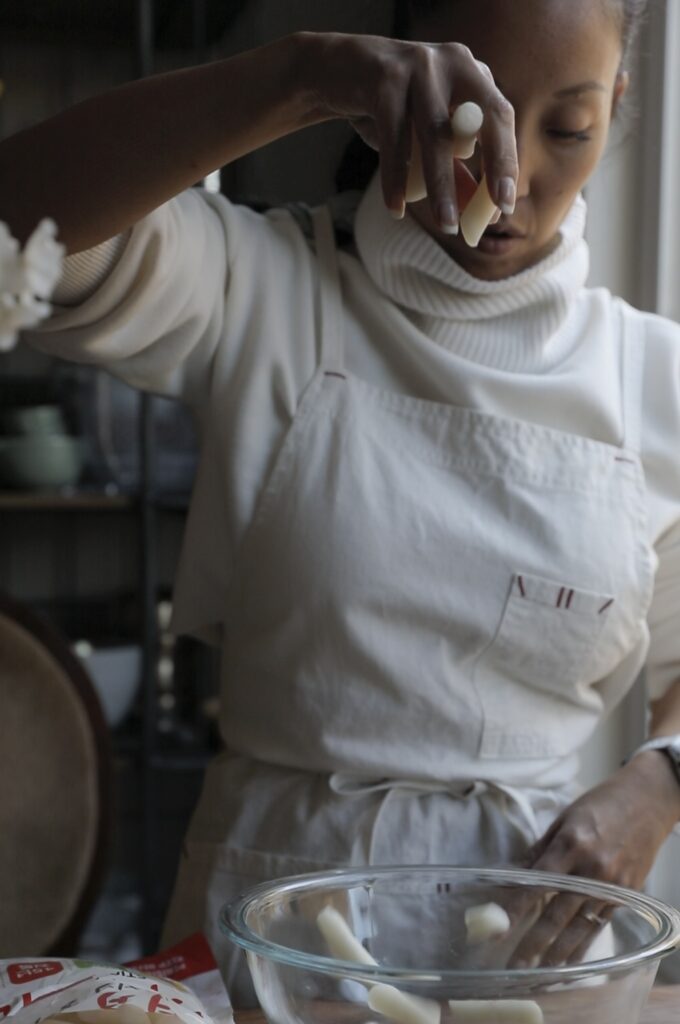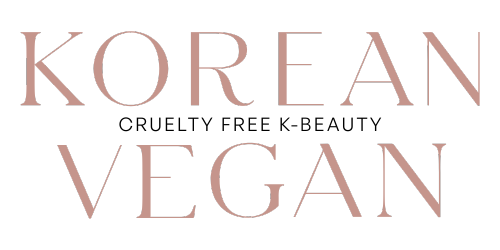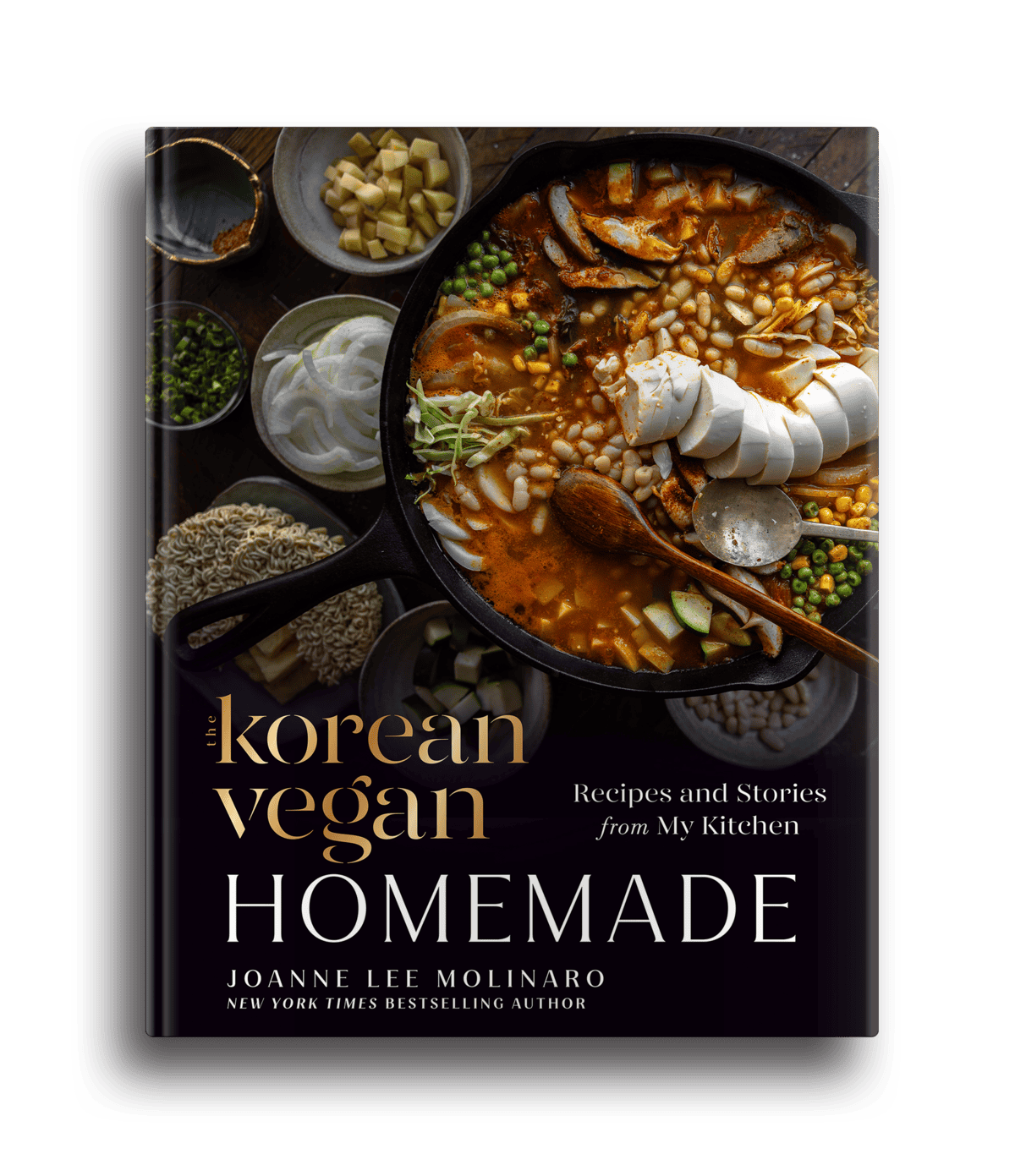When Anthony and I Fight: A Translation Error.


Recipe | Updates | Parting Thoughts

Last week, we talked with Sascha Edge about how he started running at the age of 43. The typical running arc peaks in one’s 20s–not 40s. But, Sascha continues to get faster and faster, running his personal best marathon time of 2:47 at the age of 54. Only a fraction of a fraction of the world can run a 2:47 marathon, at any age. The fact that Sascha was able to do it at 54 proves that our brains and the oft-repeated refrain “I can’t” are often the only things standing in the way of “I can.”
But what about those things that literally require our brains? For example, despite speaking fluently in both Korean and English when I was much younger, I’ve had a very difficult time picking up Italian in my late 30s and early 40s. Despite hours and hours and hours of study on my Duolingo app, a pile of Italian workbooks, and Season 1 of Scandal in Italian (mostly unwatched…), I can barely eke out “My name is Joanne Molinaro.”
I’m not alone in this. According to this study, the ability to pick up new languages drops rather precipitously after the age of 17. Although there isn’t a definitively conclusive reason for this, scientists have hypothesized that young people possess a distinct advantage when it comes to language acquisition due to any number of things: superior neuroplasticity, an earlier start that gives them additional years of learning, limitations in cognitive processing that prevent them from being distracted by irrelevant information, a lack of interference from a well-learned first language, a greater willingness to experiment and risk looking stupid, a greater desire to conform to their peers, or a greater likelihood of learning through immersion in a community of native speakers. The capacity for language acquisition drops so sharply, some posit that it is “virtually impossible” to obtain fluency after the age of 17.
As a child of immigrants, I can point to at least two people in my life who seem to have overcome the odds. Both my mother and father speak English fluently, though, perhaps the rudimentary (and I mean rudimentary) English lessons they received in high school certainly could have helped when they finally came to the United States in their late 20s. If my parents prove anything it’s that all hope isn’t lost the moment you turn 17 and set your sights on becoming a bonafide polyglot. Even the gloom-and-doom scientists seem to agree, suggesting that your best bet is to learn new languages in an immersive environment: “you’d be better off moving to a country as an adult and trying to learn a language than taking it all throughout school.”
GREAT! Yet another excuse to move to Rome!
But… What about love languages?
Now, before I lose all of you who are rolling your eyes at the “L-word,” let me share a very short story:
Back when I was in college, my mother got really sick and had to go into surgery. She returned from the hospital–her face and lips ashen, her perennially cool hands practically chattering from an invisible cold. She climbed immediately into bed. Her body was so small, you could barely tell there was anyone beneath the covers. I let her sleep for a few hours, but, in the early evening, I brought her a tray full of food. At the time, I couldn’t do much more than make rice and ladle some leftover soup into a bowl. It was an uncomfortable thing for me–I don’t think I’d ever served food to my mother before in my life.
As I set down the tray on the shelf of her bedstand, I began to hum a tune, one that I hoped might soothe my mother–something my grandmother often did for me when I was little and feeling unwell. I leaned down, slipped my right arm beneath her shoulders, and gently lifted her so that she was in a sitting position on the bed. As her face neared mine, she whispered,
“You’re singing?”
At first, I had no idea what she meant by the comment. But it soon dawned on me that she was upset, that she viewed my humming as a sign of my indifference, or, at the very least, a lack of concern for the gravity of her condition.
We were speaking very different love languages.
Can you imagine if we knew back then, “Oh, this is just a problem of translation”? As opposed to one of intention? It would have saved my mother from feeling angry and resentful towards her seemingly lackadaisical daughter, and it would have saved me from feeling defensive and hurt by my seemingly mean mother.
These types of “gaps” between our actions and their perceptions happen every single day, probably every single hour. However much we want to believe that those we love the most really understand us, there’s a very good chance they aren’t native speakers of the language we grew up speaking when it comes to expressing that thing that eludes even the most talented linguists, the most capable rhetoricians, the most brilliant poets:
Love.
I knew on Date 5 that Anthony and I had different love languages. Although I hadn’t yet fallen in love with Anthony (though he might beg to differ…), and I only had the vaguest understanding of what my own love language was, the way he spoke–sometimes clipped, direct, and, at other times, a little distracted, coupled with his propensity to joke about things I found not really “jokeable,” exposed a rift in the way we communicated.
That said, one of the nice things about having had one catastrophic relationship prior to Anthony is that I have a benchmark. Yes, there is a “gap” in the vocabulary we use to say “I love you,” but, more often than not, we are on the same page. In my prior marriage, we fought nearly once a week, often lasting days. Anthony and I don’t fight very much, and when we do, we usually thaw in a few hours. I know that how often and to what degree a couple fights isn’t always the best barometer for romantic health, but having lived through the horrible end of that spectrum, I can confidently say that being with Anthony opened up to me a whole new landscape of mature, non-toxic, adult relationships.
A few nights ago, however, we had one of our rare “loud” disagreements.
It started out the way it often does–obtusely. We began arguing, quite heatedly, over whether there is ever such a thing as the ethical consumption of eggs or dairy when divorced from the exploitative machine of Big Ag and factory farming. About two years ago, I began studying animal ethics in a semi-casual way–mostly to develop a more considered approach to my own veganism. I’ve since broadened my reading to encompass a more wholesome understanding of the things that appear to drive human behavior, how we arrive at definitions of the words “right” and “wrong.” Every once in a while, I’ll pose a provocative ethical dilemma to Anthony in order to help round out my thinking. Anthony thinks I enjoy these discussions as a way of flexing my debate muscles or intellectual might, reliving the “glory days” from the courtroom. But this isn’t true.
The discussion of animal ethics is just a subtopic of a much more urgent one, a profoundly personal one–what is the meaning of life? And, more importantly, what happens to those we love when they die? I thus lobbed the ethical curveball over a plate of French fries in our hotel room in Chicago (“do you think it’s EVER ok to eat eggs or drink cow’s milk?”), while harboring a much more pressing agenda. I wanted to get an answer to a question that I couldn’t stop asking:
Is the Rainbow Bridge real and if so, will my Rudy be waiting for me at the end of it?
Two nights prior to our rendezvous with room service, I’d had a dream; one in which I drew a picture of a bright sun, fluffy clouds, a large rainbow that took up the majority of the white page, and a tiny little dog waiting primly at its feet. I woke up and it was like my dog had died all over again.
I rolled out of bed and headed to the suitcase I’d packed the night before. It was Mother’s Day and we had an early flight to Chicago to visit with our moms. I hardly said two words to Anthony. On the car ride to LAX, I allowed myself to bring that picture I drew in my dreams to life–a real sun dripping its warmth through thick clouds like hot honey, a majestic rainbow spreading itself across the sky like one of my mother’s fans, and a real, live, breathing, white bichon-poodle named Rudy (sometimes called Roodles) waiting on pins and needles for me. I stared out the window of our Uber, watched the mist shrink back into the hills as if frightened by my longing.
It still took my breath away.
How fucking much I wanted something I could not have.
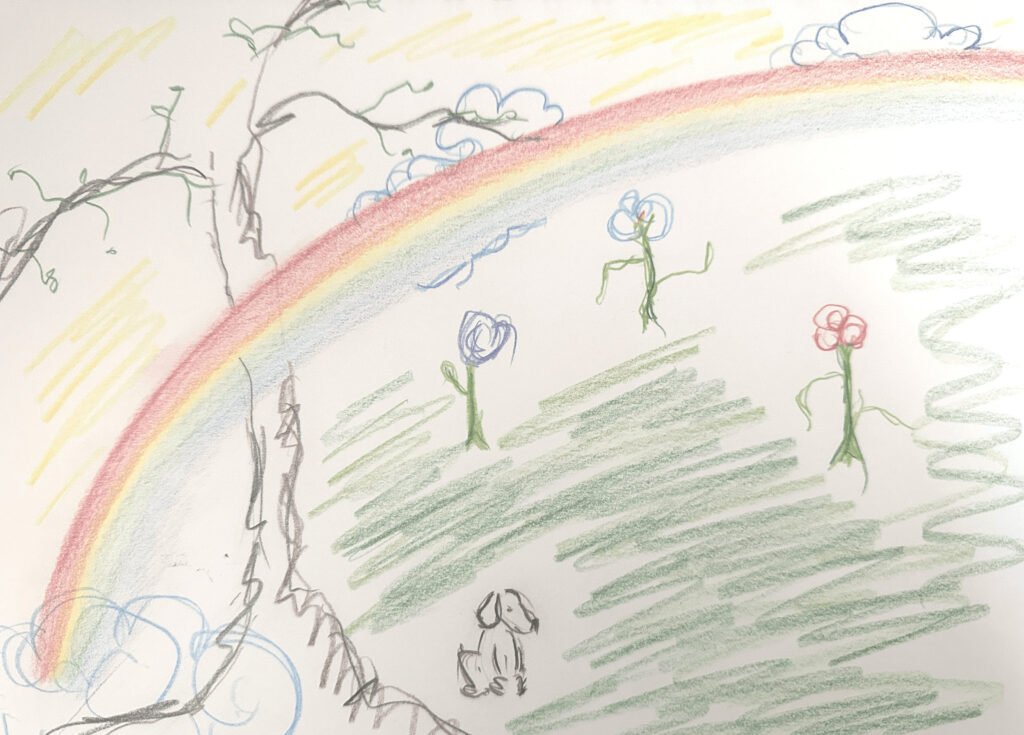
I don’t like to talk to Anthony about my grief. There’s some part of me that understands, instinctively, that this wound remains open and quivering, and should Anthony brush up against it with anything less than surgical precision, he will hurt me. So, instead of simply broaching the subject, I buried myself in the Kindle version of Camus’s essays on the meaning of life and tried to convince myself that I could be happy even if I never got to see Rudy again (spoiler alert: that’s Camus’s conclusion). And yet, there was also a part of me that knew the French philosopher’s charmingly persuasive prose could only do so much. As my husband, Anthony, and Anthony alone, had the power to soothe me–not make it go away, but make it hurt less, I wanted him to sit with me, talk to me, tease out the edges of my grief so that I didn’t feel so goddamn alone in it.
But… this is not Anthony’s love language.
For two days, we were the proverbial ships passing in the night. Anthony could sense something was upsetting me, but didn’t know how much effort he should make to get to the bottom of it. When he asked what was wrong, I responded with a terse, “I had a bad dream about Rudy” in a way that hardly invited any further conversation. I stayed inside a cloud of unhappiness and even resentment–I felt defeated by death and thus powerless in life, and Anthony didn’t really know how to cut through the fog to get to me, even though I wanted him to. And I translated that incapacity as indifference.
We had very different views on whether or not one could ever ethically consume eggs or dairy, and perhaps because of the emotional tundra that had wedged itself between us for the past 48 hours, I found that difference to be unacceptable, unbearable. All of a sudden, an intellectual exercise transformed into the lynchpin of our entire marriage. Everything rested on our ability to “get on the same page.” My anxiety cast an uncomfortable urgency over our “debate,” and Anthony read this as a desire to “win the argument,” an instinct cultivated from years in the courtroom.
The conversation suddenly shifted from a largely academic one about a hypothetical that was unlikely to ever materialize in our own lives (neither of us will ever voluntarily consume dairy or eggs in our lifetimes) to a very real, very non-hypothetical dispute over what I viewed as a lack of emotional support from my partner.
To be fair, despite my foul mood, Anthony had stayed by my side, rearranged his schedule to have lunch with me, muscled through intense waves of self-doubt (“wait, is she mad at me?”), bit his tongue when I was annoyingly unresponsive, and tried his darndest to make me laugh. These were all expressions in his love language. But, notwithstanding his efforts, I found that his constant presence only served as a reminder of his inability to actually say anything to comfort me, his jokes to be totally insensitive and even hurtful. But mostly, his seeming unwillingness to climb down into the pit with me for a deep heart-to-heart on a topic I was too afraid to speak with anyone else about filled me with indescribable loneliness.
As a lawyer, I meticulously stack my arguments together in a way that makes my conclusion the only possible conclusion. This is sometimes referred to as the “funneling” technique. And yet, I always warn my clients that even the “best case” has only an 80% chance of winning at trial. The odds are far longer, though, when you’re arguing with your partner. Still, it never fails to astonish me that the man with whom I share my life could see some aspects of our partnership so very differently from how I do. Sometimes, it very much feels like–you guessed it–we’re speaking different languages.
I thought that if I just laid out my feelings, lined everything up just like I do one of my legal briefs, Anthony would obviously see things my way. We’d iron out our minor differences, experiencing just a few minutes of minimal tension, then catch an episode of Blacklist before going to bed.
This, of course, almost never happens.
After two hours, our argument crescendoed to its peak, at which point we were raising our voices above the city traffic outside our window, and Anthony was wiping his head in the way he does when he’s ready to call it quits and walk away.
The breakthrough in what was starting to look like an impasse came when I confessed,
“You wanna know why I didn’t just tell you what was upsetting me? Because I was scared you would judge me. That you would feel what I feel for myself–ashamed. Ashamed at how I can’t seem to get over my dog dying after nearly a year. Ashamed that I’m still crying over a dog.” I paused to spread my fingers across the table we’d been arguing at for hours. “I was projecting what I feel about myself onto you, assuming that you would react in the same way.”
Anthony’s eyes softened in that way that always reminds me of this painting of the Amalfi Coast by his brother. The typically colorful turrets and facades of the small buildings dotting the iconic coast are suffused in gold, those fiery minutes before the purple onset of dusk. I once called them his “Amalfi Eyes.”
He looked at me and said, “You know? The other day, I was looking at a few pictures of our Rudy…. And I… I miss him, too.”
His words lined up in front of me like subtitles on the Italian dramas we like to watch. They didn’t say “I’m hurting a lot, too,” but I could see the blank spaces between his words, the emptiness that barely held them together like a dark thread.
He then said, “Please… have some faith in me.”
He got up from his seat and came towards me. Pulled my face up to meet his and repeated,
“Have some faith in me.”
And it occurred to me, then, that my husband learned to speak Italian when he was 28 years old.
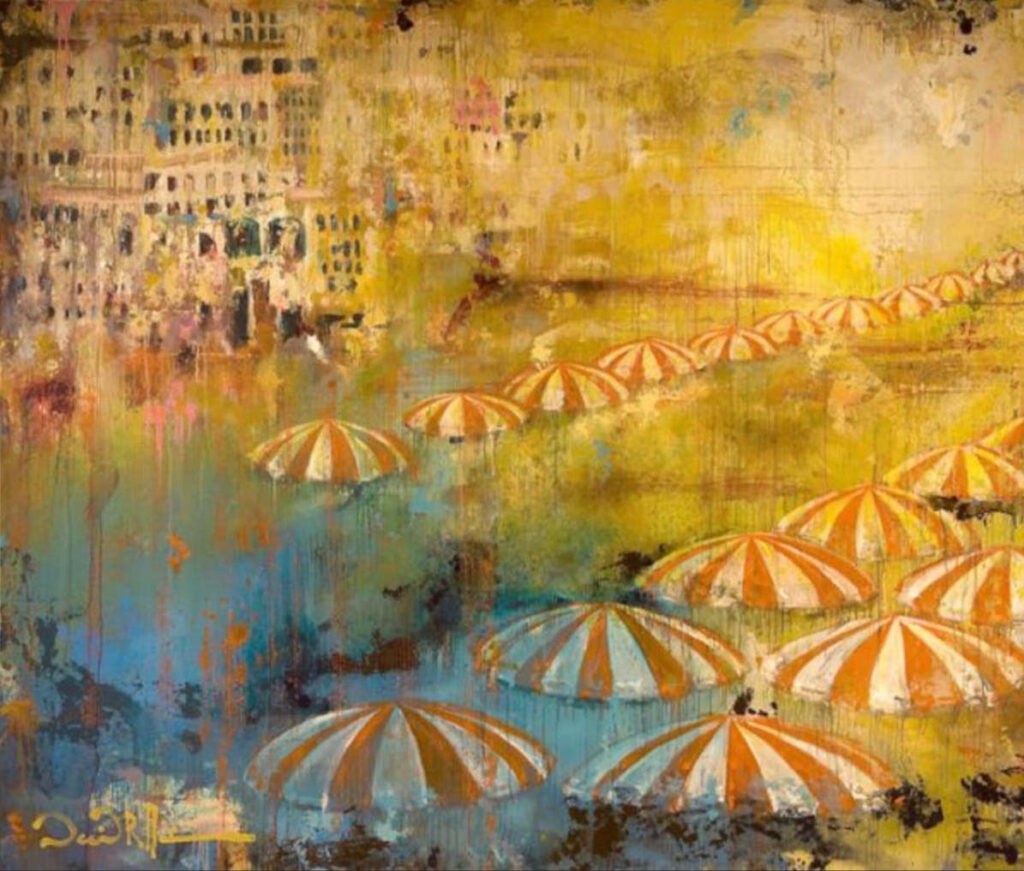
What’s Your Love language?
I thought it might be interesting if we both took a “Love Languages” quiz to determine where the gaps in our lexicon lay. Here are our tests side-by-side (me on the left and Anthony on the right):
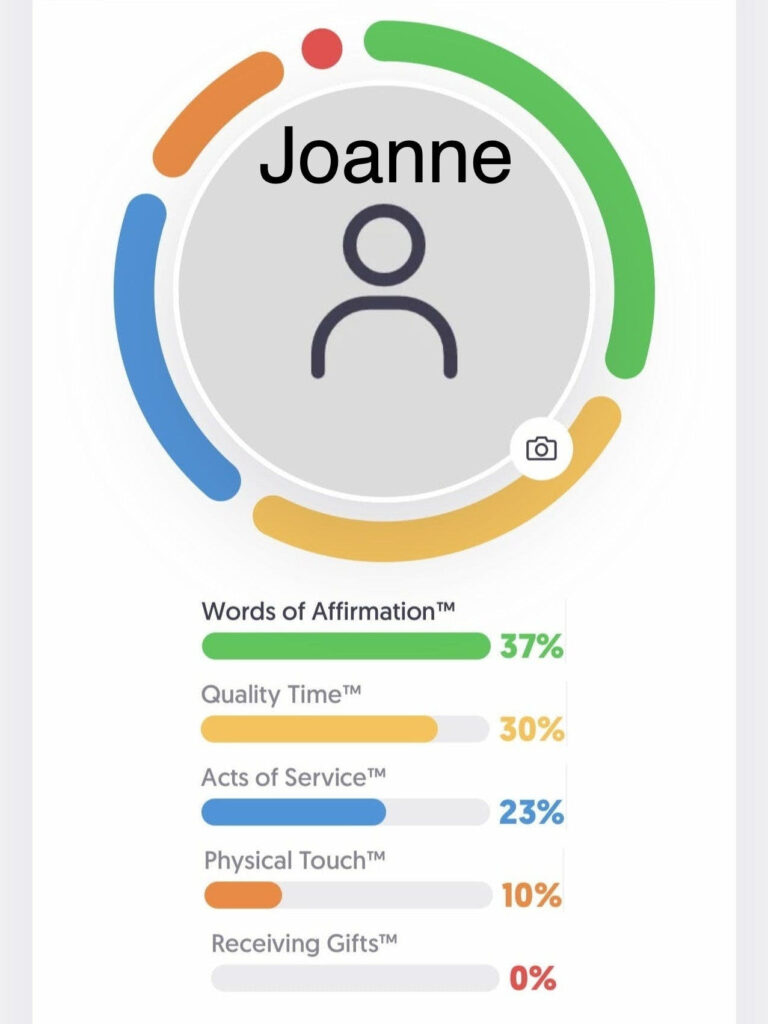
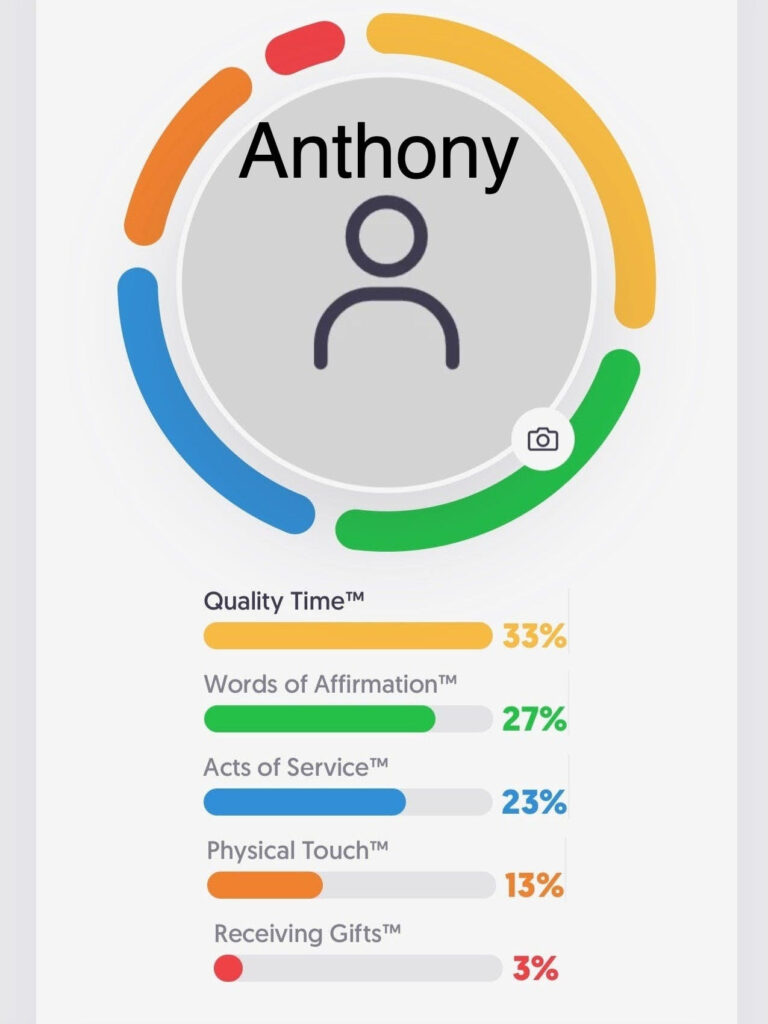
Listen to This Week’s Newsletter:
Apple | Spotify | Google
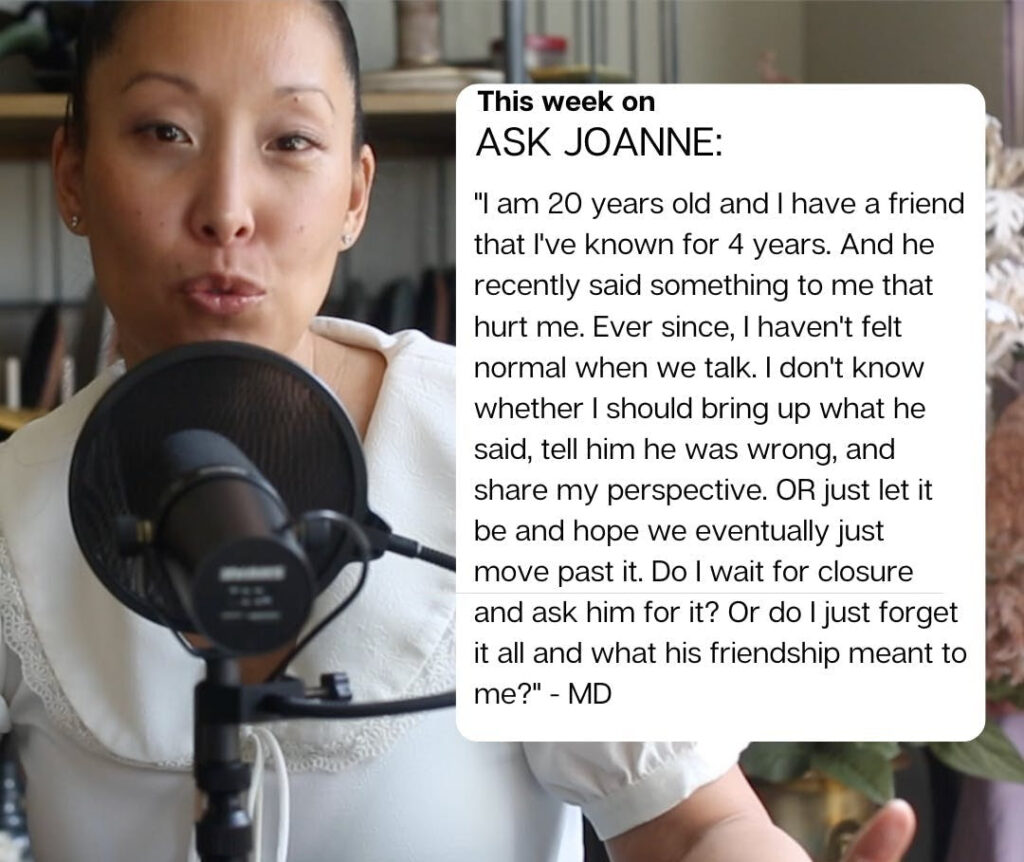
Dear MD,
I’m sorry you’re experiencing this rift between yourself and your friend. These types of situations can be stressful–not just because you’re confronted with the potential loss of a valued friendship, but because they tend to provoke uncomfortable questions. Am I making too big a deal about this? Did I do something wrong? Am I not a good friend? Am I not a good person? Some people might be impervious to this type of introspective spiral, but I’ve found that many people have a tendency to attempt to control a situation like this by looking inwards. So, the first thing I would say is that it’s important not to fall into the trap of turning against yourself in these situations. However you decide to act, your feelings are still valid.
When it comes to any relationship, I try to view things in terms of values. Instead of asking “was he right to do what he did?” or “am I wrong to react this way?”, ask yourself, “does what he did affect me in a way that makes his friendship less valuable to me?” and “am I reacting in a way that preserves or threatens the value of my friendship with him?” In other words, remove any attribution of “right” or “wrong” as you consider the following questions:
- Do I feel less safe expressing myself and being myself around him? If no, you probably already know that it’s best to acknowledge your feelings and then move on. If yes, move onto the next question.
- Is it possible that I will recover that feeling of safety with a little time, even if he never acknowledges my hurt? If yes, give it a week or two, and see if you feel better. If no, move onto the next question.
- Am I ready and willing to risk losing my friendship altogether by confronting him about it? This is the hardest question to answer, because it’s very difficult to predict how the loss of this friendship will really impact you until it happens. It’s therefore critical that you get honest with how much you value his friendship, why you value his friendship.
If, after an honest interrogation of your feelings, the answer to the last question is yes, then the only task left to you is planning a discussion with your friend that mitigates any risk of permanent fall-out–to you, to him, to your friendship. In this, I can only counsel you with what has worked for me:
- Approach the conversation with a tone of curiosity. Instead of finding him “guilty” from the outset, stay open to the possibility that he hurt you unintentionally or that this was a misunderstanding.
- Regardless of his explanation, always remember that your feelings are factual–they happened regardless of whether he intended to cause them.
- Remember, too, that his feelings are factual–even if you disagree with whether or not he was entitled to them. If, after you’ve started chatting with him, you continue to believe that this friendship is worth preserving, then it’s important to remember that the primary objective is NOT to assign blame, but to prevent this sort of thing happening in the future.
- Don’t make promises you can’t keep and don’t require promises of him that you’re pretty sure he can’t keep. It’s always tempting to say things like, “I’ll never ever do/say that again,” especially when you see a light at the end of a tunnel. But all this will do is set you up for the same hurt and the same argument at some point in the future.
Anthony and I once had such a big fight that he decided to break up with me. I was absolutely devastated and spent much of the time crying, sleeping, or picking over a box of chocolate truffles. I was living with my brother and sister-in-law at the time, and suffice it to say, they were terrifically worried about me. In order to set their minds at ease, one night, I told them through tears, “This hurts a lot. But however much it hurts… I know I’m going to be ok.”
That is my final piece of advice to you, MD. Just remember that no matter what happens with this friendship, you’re going to be ok.
This Week’s Recipe Inspiration – Apple Donuts!

I was rifling through my digital recipe box when I stumbled across these beautiful apple donuts. I know, I know–apples aren’t in season for a few months, but is there really ever a bad time for apple donuts? I didn’t think so…!
Ingredients
4 cups flour
2 tsp baking powder
1 tsp baking soda
1 1/2 tsp salt
2 tsp nutmeg
1 tsp coriander
2 tbsp cinnamon
1/3 cup vegan butter
1 cup sugar plus 1/4 cup for coating
3/4 cup non dairy milk + 1 tbsp vinegar
1 tbsp vanilla extract
1 cup unsweetened applesauce
1 1/2 cup grated apples
Method
Preheat oven to 375° F. Mix together milk + vinegar and set aside. In a stand mixer (or a hand mixer), using the paddle attachment, mix together butter and sugar on medium until sugar is well incorporated into butter. Meanwhile, in a separate bowl, mix together flour, baking powder and soda, salt, and spices. Slowly add milk+vinegar mixture to butter+sugar mixture. Next add vanilla, grated apples, and applesauce. While still in stand mixer (or while using hand mixer), slowly incorporate dry ingredients in thirds. Stop mixing as soon as dry ingredients are incorporated, so as not to overmix (donuts will get tough). Place batter into a large piping bag or ziplock bag and snip the tip off (1/2 inch). Squeeze donut batter into greased donut plan and bake in oven for no more than 10 minutes. Remove from oven and sprinkle with sugar. For extra decadence, coat the donuts with a little melted butter and THEN sprinkle with sugar.
Updates & Random Things.
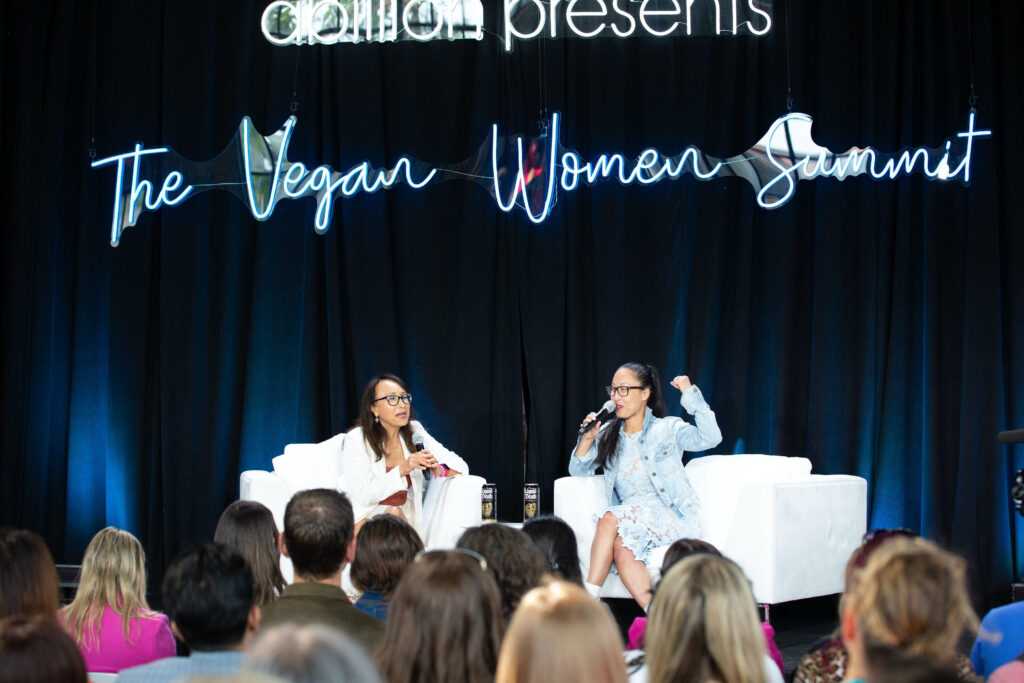
- Vegan Women Summit 2023. Last week, I had the distinct honor of moderating a chat with Miyoko Schinner at this year’s Vegan Women Summit in New York. I also had a chance to meet so many members of the TKV Community, which is always so heartening. Thanks to all of you who came out!!
- What I’m Watching. We’ve finally made it through 9 seasons of Blacklist and we’ve decided to take a short hiatus so that we can finish the current season when it’s completed (in July). We’ve thus picked back up on The Glory, a classic revenge K-Drama starring the incomparable Song Hye Kyo. If you like extremely dark revenge stories (think Taken meets Mean Girls), I highly recommend The Glory. It’ll have you addicted within minutes.
- TKV Cookbook 2. Cookbook 2 is in full swing at the TKV kitchen and studio. I learned a lot from the process of putting together cookbook 1, but, for the most part, this time around it’s not that much different. I spoke to one of my favorite cookbook authors, Carleigh Bodrug (highly recommend her book Plant You), and it reminded me that some of the most beloved cookbooks are what she would call the “scrappy” ones. The book will feature, quite simply, the things I like to eat, inspired by local and seasonal ingredients. As with Book 1, I cook the food, put it in a nice bowl or plate, then snap a few photos of it. Here’s a sneak peek (mostly unedited):
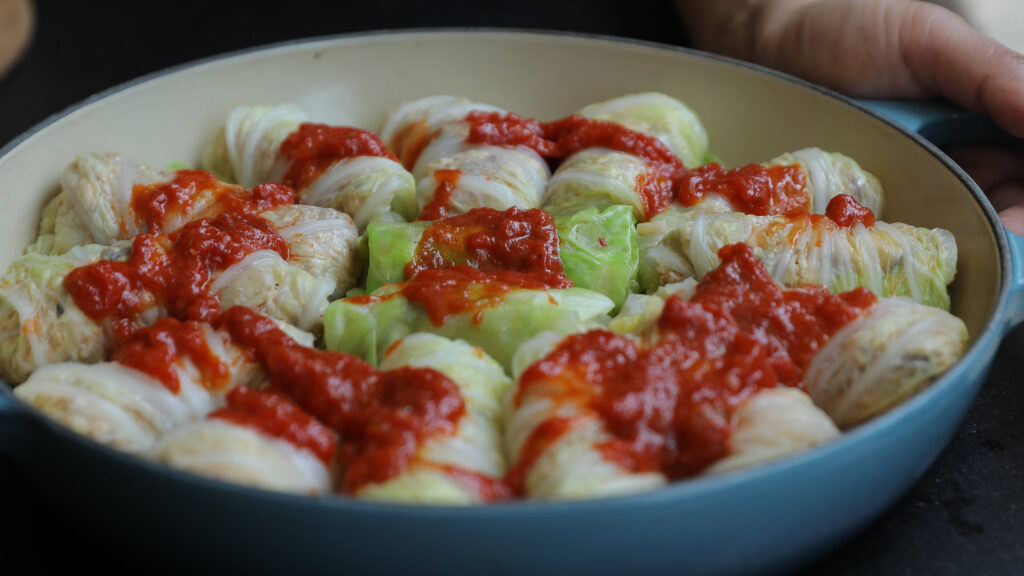
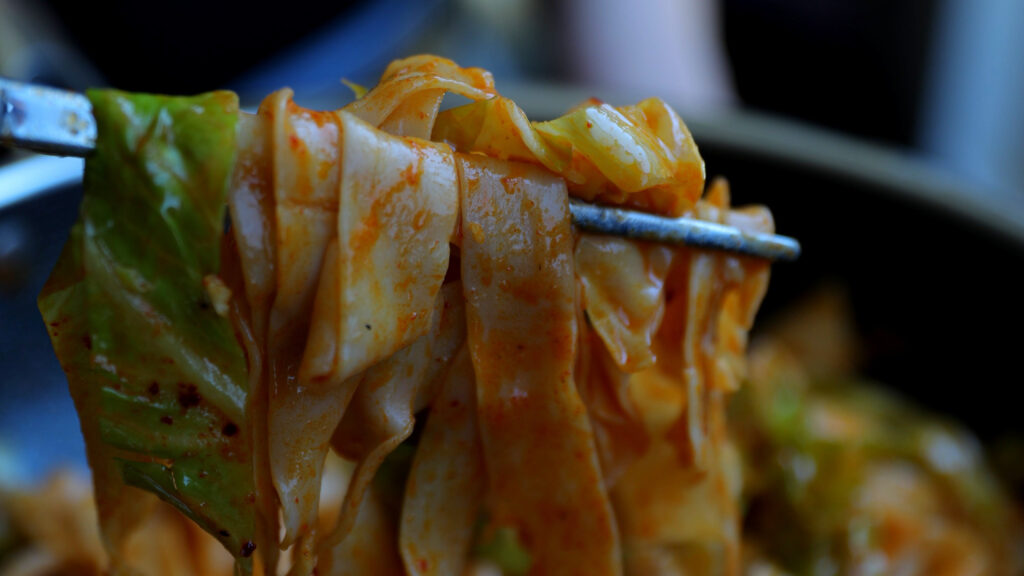
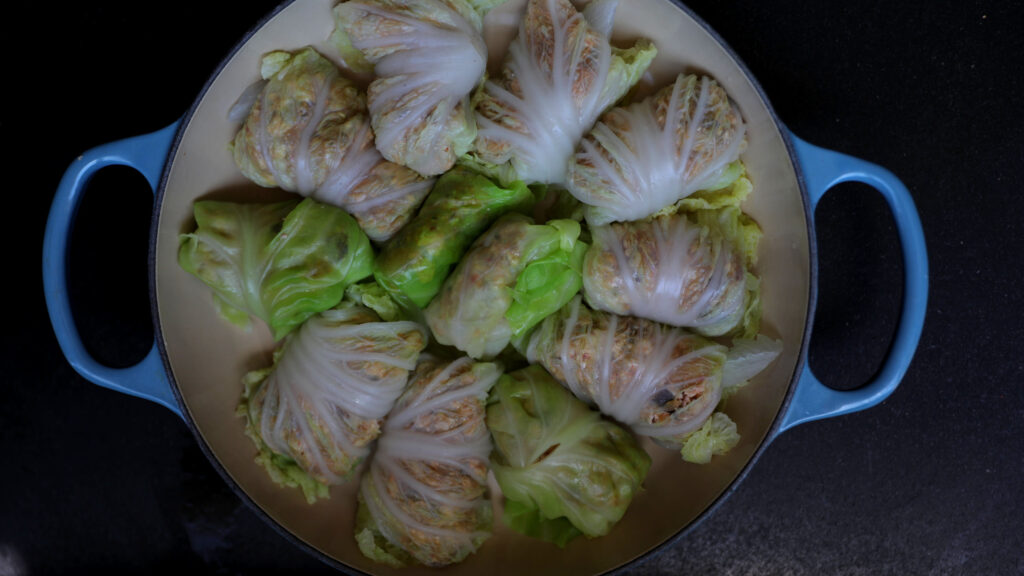
Parting Thoughts – A Bit of Poetic Prose.

This morning, I step on 13th and 5th, past the bustle of Sunday brunch, a tall slender woman with a golden chignon and camel suede boots smelling of Upper Eastern spice and self-projection. She parts her lips to murmur something to the man holding her elbow, I plunge into her mouth for a moment’s moment to collect a trace of an older man with hazel eyes and a dark stubble, the way his after shave inveigled its way into her hair when she let it loose to tangle with the heaving Brunswick, when her toes pressed against a mat of dried pine needles as if to remind the world of how to pronounce her name.
Love is…. A taking.
When I was a little girl, my mother brought me to a beach on Lake Michigan. Smooth stones and dull maple leaves litter the shore. Long fingers of black algae curl up from the tide as I pick my way to the mouth of the lake, stoop down to take my fair share of the earth’s sorrow into my cupped hands beneath Omma’s gaze. I bring them to my lips, tongue darting out to taste the tang of torn pages, a bead of blood from a paper cut, a faith broken so absolutely it dissolves into the receding tide like the perfume I couldn’t follow when Omma went to work at night.
“There is a hole, Sunyoung,” my mother confides, “one you can never fill with seawater, however much you drink.”
There is a forgetting.
I lose the stones I deposited into my pockets that day on the beach amid conference calls, emails, and mortgage payments. I post things to Instagram to help me recall the smell of wet algae and dirt, only the paper heart seems a perversion, a cartoon of the woman on her way to Sunday brunch on 13th and 5th. I grip the edges of the hole in my chest, the one that ripped apart when my mother halved her body, and I shiver as I bury my hands into my coat because it is a cold fall day in New York and the ache of the world is too sweet to bear without the soft tremor of longleaf pines and tender hesitation.
– Joanne


